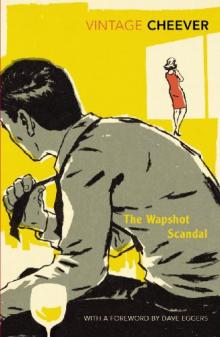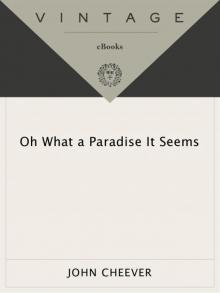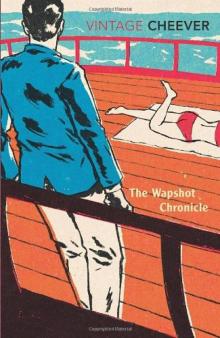- Home
- John Cheever
Oh What a Paradise It Seems Page 5
Oh What a Paradise It Seems Read online
Page 5
“You keep your hands off my groceries,” shouted Maria. “You keep your hands off my groceries or I’ll call the police.” She reached into Betsy’s cart, took out a dozen eggs and threw them onto the floor.
Then Betsy, in an overwhelming paroxysm of anger, seized Maria’s cart and, drawing it toward her, tipped all of the groceries onto the floor. Maria, quite as overwhelmed, and passionate as if she felt herself to be a figure in some ancient patriotic or religious contest, came at Betsy, swinging. Their raised voices, the screaming, drew a crowd, and perhaps a hundred shoppers, with their carts, gathered to watch these women fighting over groceries and precedents. The manager, helped by some members of the crowd, finally succeeded in parting the two women and sending them out on separate ways into the rainy dusk.
7
AT the time of which I’m writing, vogues in healing were changing swiftly, and many of the old-line of yesterday’s therapists were wiping windshields in carwashes. While the nomenclature “shrink” was long out of fashion and had been replaced by the old term “psychoanalyst,” the conviction that one could master the mysteriousness of life through the interpretation of dreams and an exhaustive analysis of one’s early life was perhaps the most prevalent form of belief in the Western World. This stood, of course, four-square upon the ruins of the legitimate confessional and the reformation of the roles played by parents in one’s coming of age. The Freudian vocabulary had sunk well into the vulgate, and when the waitress at a truck drivers’ diner spilled your beer she would say: “Oops. That was a Freudian slip.” If you asked her what she meant she would say: “What’s the matter with you? Born yesterday? Freudian means slippery. Get with it.”
Sears, seeking counsel, thought of the word “alienist” because it had been in use when he was a young man and because it described that anguish that had racked him when he stood with his roses by the unanswered door. There had been nothing, absolutely nothing unfamiliar in the scene and yet he had felt himself more cruelly estranged than he had ever felt on an overcast Monday morning in some mountain village in the Carpathians. His doctor had given him a list of psychiatrists and he chose a doctor named Palmer because he had known a happy family of that name in the elm-tree-shaded lanes of his serene coming of age. Dr. Palmer answered the telephone himself and Sears made an appointment.
The doctor’s office suffered that netherness that Sears had observed in Renée’s office. He shared a waiting room, a toilet and some old magazines with a number of other practitioners. He was a tall man whom Sears would have described as ill-favored. Dr. Palmer was quite bald and the impression that he gave was mostly of bulk. He seemed to Sears mysteriously shabby, considering his East Side address, but Sears would blame this on his own parochialism. He was mistaken. Dr. Palmer was shabby because he was desperately in need of money. He was quite unsuccessful, plagued by the intensely internecine politics of his profession and worried about paying the rent. Considering the area in which Sears sought counsel, his choice of Dr. Palmer had been unlucky. Dr. Palmer was a homosexual spinster.
By “spinster” one means that Dr. Palmer, by a combination of ardent desire and pitiless repression, had exacerbated his feeling on the subject. He had, it seemed, from time to time endured random erections for a naked and anonymous male torso or the declivity of a male spine, and he had treated these arousals with vigilant repression. Indeed, he had crushed these random swellings as if they breached that paradigm that furnished his equilibrium. He was the victim of an erotic distress that in earlier and more traditional societies had characterized the unmarried woman who played out a role that was marked by bitterness, suspicion and loneliness.
While Sears told the doctor about the day he had bought the yellow roses for Renée and what he and the elevator operator had done the doctor squirmed in his chair. “You seem to think it neurotic of me,” said Sears politely, “to be anxious about being homosexual, but in retrospect it seems to me probably the most sensible anxiety I have ever entertained. I’ve never really had any reason to be anxious about money or friends or position or health, but I did enjoy myself with the elevator man and if I should have to declare myself a homosexual it would be the end of my life.
“My sexual nature seems to contain some self-destructive elements and I’ve come to you to have these explained. There seem to be contrary polarities in my constitution. I think my sexual conduct moral only in that it reflects on my concept of love. This seems to be of the first importance. Renée had hanging, in one of her windows, a small crystal cut with many facets. When this filled with light it threw a spectrum on the wall, and one late afternoon I said to her, quite sincerely, that my love for her was quite as important, as iridescent and as insubstantial, as the beam of colored light. She said that I didn’t understand the first thing about women but she always said that. She once took my cock out of her mouth only long enough to tell me that I didn’t understand the first thing about women.”
The doctor’s offices were on the fourth floor of an old-fashioned building with windows that opened and shut, and through these windows Sears then heard the loud, cheerful voice of a man calling some other man to throw him a ball. It was a voice from the playing field but the depth of his longing and nostalgia was not only for his youth but for the robustness, simplicity and beauty that life could possess; and how far he had strayed from this! He was paying the doctor’s rent in a sincere attempt to recapture this simplicity and usefulness, but the distance he had come seemed grievous.
“What are you thinking about?” asked Dr. Palmer.
“I heard a voice from the street,” said Sears. “It reminded me of summer days and happier times.”
“Infantilism is obviously one of your greatest handicaps,” said the doctor.
“I mean,” said Sears, “that it reminded me of a fourth down with something like twenty to go. All you can do is to punt but how marvelous it is to punt, that feeling of booting a ball way down the field on a fourth down is such a hopeful feeling, such a feeling of beginning that I’ve often wondered why football never caught on in other countries.”
“Did you ever make the first team?” asked Palmer.
“No, no,” said Sears, quite sadly. “I was always second squad and a substitute some of the time.”
“You’re getting a little heavy,” said the doctor.
Sears stood and said, “I’m wearing the belt I wore when I played football.”
“Did you ever think of marrying?” asked the doctor.
“I was married twice,” said Sears.
“Divorced?” asked the doctor.
“Both of my wives died,” said Sears.
“Hmmmm,” said Dr. Palmer.
Sears had met his first wife—beloved Amelia—at the intermission of a concert in Boston. Her hair was that light-brown hue that, early in life, turns a lovely yellow during a long summer spent sensibly on beaches, boat decks and tennis courts. This crowning with yellow passes swiftly—that may be one of its charms—and the gift is lost in one’s early twenties. Their encounter came late in October; she was barely twenty and her hair was streaked with gold. This contrasted with her eyebrows. These were uncommonly heavy and dark and she carried her head in a lifted manner as if her eyebrows were something of a burden. Her figure was superb and she wore that afternoon a black velvet dress and carried a copy of Paris Match, folded to a page where there was a recipe for codfish served with cheese sauce. Sears felt at once that he had known her in some other life and he would never have any occasion to question the authority of this sensation of familiarity. When she lay dying in his arms, twenty years later, his grief was unassuageable but there was a sense that she was returning to some stratum of existence where they had first met and where they would meet again.
His second wife was not so much his choice as he was hers. She had ended an unhappy, childless marriage with a divorce, and when she proposed to Sears he simply accepted. She claimed to have great insights into the future, and she assured Sears that they would be v
ery happy together. After their marriage Sears discovered that Estelle, his wife, considered herself a professional in occult matters. She defended her prescience competitively as if supernatural insights were a field sport. Sears’s only other experience in this area had been in Eastern Europe, where there was a celebrated prophetess named Gallia. Sears had heard of her mostly from American businessmen who traveled to the cave where she lived and paid large sums of money for her advice.
One evening, in Eastern Europe, a chance American drinking companion had described Gallia’s powers to Sears. She had prophesied an accident at their New Mexico mines, where millions of gallons of radioactive mill tailings would have been spilled. She had also, that year, prophesied that uranium prices would fall. Sears had been told that she had been blinded by lightning as a child and that she lived in an extinct volcano, not far from where one of the most famous oracles of the ancient world had lived. The Minister of Information had often offered to try and arrange a meeting with Gallia, but Sears’s lack of interest in the occult was genuine. Returning one late afternoon to his hotel after a tiring day, he found an aide to the Minister of Information in the lobby with the message that Gallia would see him. He asked if there was time to change his shirt and he was told there was not. He got into one of those large cars that cabinet ministers enjoy in socialist countries.
In the car he joined his interpreter, a middle-aged woman whose language with him would be French. The minister had furnished the car with some ice and a bottle of whiskey. Sears was terribly tired. The car radio was on, very loud, and Sears knew enough not to have it turned off; it would be such a disappointment to the chauffeur. There is some sameness to car radio music all over the world and he would hear Hoagy Carmichael’s “Stardust” and the second Razumovsky Quartet. In that part of the world there were regular reports on the water level of the Danube River. It was a country where there were very few cars, and they traveled through the farmland at a hundred miles an hour. This splendid rich country was farmed still by hand. He was not that afternoon to see a single piece of farm machinery, and although it was late in the day men and women were still hoeing the rows. A few of these waved happily to the limousine. The beauty of fertile, well-irrigated and intelligently planted farmland moved him and he was able to trace and admire the fact that the variety of plantings reflected the changed nature of the soil as they approached the acid lava of the old volcanos he saw on the horizon.
He wondered what questions he might ask the oracle. His business prospered, he loved his wife and his children, his investments were insured and his health was splendid. He couldn’t think of anything to ask her. He had been told by his American friend that she was a terrifying presence, so frightening that it was sometimes difficult to ask her your prepared questions. He tried to imagine some traditional monster with a head covered with adders and a mouth filled with fire, but he was either too tired or too drunk or too solaced by the beauty of the farmland to feel anxious about his interview with Gallia. His interpreter was telling him about her beginnings. The story was nearly as familiar as the radio music. Her family had lost the houses and villas that most families have lost at one time or another.
They arrived at the foot of the volcano a little before dark. “Aren’t you frightened?” the interpreter asked. “Oh yes, yes,” said Sears politely. He did not feel that he was giving the interview its importance. There was a little garden at the entrance to the prophetess’s cave and Sears noticed that the soil was so acid it supported almost nothing but parsley. “Please let me take your arm,” said the interpreter. “I’m so frightened I can hardly speak.”
There was a sort of room in the cave lighted by a single electric bulb. Sears wondered where the power came from. The prophetess sat at a plain table covered with clean oilcloth. She was a middle-aged woman whose hair had begun to gray and who held her head high with her blinded eyes closed. She wore a clean cotton dress. Sears’s feeling for her was one of absolute friendliness. This wonder, who had prophesied the fall of uranium prices, excited in him the broadest smile.
She asked to feel something of his and he gave her his wallet. She fingered the wallet and began to smile. Then she began to laugh. So did Sears. She returned the wallet to him and said something to his interpreter. “I have no idea what she means,” said the interpreter, “but what she said was ‘La grande poésie de la vie.’” The prophetess stood and so did Sears. They were both laughing. Then she held out her arms and he embraced her. They parted, laughing. Night had fallen and as soon as he started the car the chauffeur turned on the radio to very loud music and they returned to the capital.
This cheerful brush with a prophet was no help at all in Sears’s understanding of Estelle. She thought her prophetic attributes of the first importance. She seemed to think of them more as an achievement than a gift. She felt that the world we see—the world Sears adored—was superficial and, in her case, transparent and that she could see a more real world where love and death were visibly ordained. It seemed to Sears that her foresight was largely pessimistic. She most often prophesied quarrels, poverty, divorce, madness and suicide. Sears could not remember her having prophesied any triumphs of the spirit. She dyed her hair red and wore lime-green dresses, and when you were introduced to her you would feel that you had met her at cocktail parties. I don’t mean five or ten cocktail parties—I mean hundreds and hundreds of cocktail parties before that social ceremony vanished from the calendar and when the cocktail party seemed as much a part of nightfall as the lengthening shadows. She seemed so allied to the cocktail party that one wondered what would become of her when that ritual had become obsolete.
It would have been very unlike Sears to check on the accuracy of her prophecies. When they returned home in the evening after a party she would sit at her dressing table and say that it had been revealed to her that the A’s would divorce, B would lose all of his money, C would be arrested for fraud and Mrs. E would go mad. She considered prophecy to be her outstanding social gift, and the complex irony of claiming to know the future was revealed one night to Sears when they were entertaining. Estelle was a dreadful cook—indeed she was a dangerous cook and she had that night prepared a risotto that was particularly lethal. While she prophesied lengthily the misfortunes of a family in the neighborhood, Sears worried a little about what he knew of the immediate future. He knew that at three or four in the morning that was to come every one of their twelve guests, poisoned by the risotto, would spend an hour or more on the toilet, racked by excruciating diarrhea. While Estelle, with her eyes half-closed, sketched the future, Sears wondered why her prescience should overlook that violence in the immediate future that he was able to predict.
Her ending was rather like this. She had been to a matinee in Philadelphia and had returned by train to the suburb where they then lived. She could reach the lot where her car was parked by an underpass beneath the tracks or by an unsafe wooden walk that predated the underpass. It was a winter dusk. She had started across the walk when a young man shouted: “Hey, lady, that ain’t safe. A train is coming.” “Who do you think you are speaking to?” she exclaimed, believing in introductions and other courtesies. “I happen to know the future.” She stepped straight into the path of the Trenton Express and nothing was found of her but a scrap of veiling and a high-heeled shoe.
“Your male lover is a traditional invention of the neurotic,” said Dr. Palmer. “You have invented some ghostly surrogate of a lost school friend or a male relation from your early youth.”
“I’m not sure what you mean by ghost,” said Sears. “It may be that for a man of my age love is rather elusive. I seem these days to know love only briefly, but I honestly can’t agree with you when you say that Eduardo is a surrogate. He seems to offer me an understanding of modes of loneliness that are quite new to me and new I expect to other men, since they mostly involve new places like airports.”
“Of course you’re afraid of flying,” said the alienist.
“I am not afraid
of flying,” said Sears, “but I am afraid of airports.”
“Do you really think you understand Renée?”
“Oh, no,” exclaimed Sears, “but I never really cared about those parts of her life that she meant to keep private. I mean, I kept picking her up in these church basements where she was trying to stop smoking or drinking or eating too much. Sometimes I thought it was all three. Sometimes when we go out to a restaurant she eats most of my dinner, but she never gets fat. I think she wants to improve her ways, and I believe there are more people who feel like this than you might guess from looking at the faces in the street.”
“Do you have any friends?” asked Dr. Palmer.
“I have loads of friends,” said Sears.
“That is,” said the doctor, “the classical reply of the neurotic, who constructs a carapace of friendliness and popularity to conceal his clinical aloneness. If you have so many friends you might send a few my way as patients. The politics in this profession are absolutely indescribable. Otherwise I wouldn’t ask your help. I’d like to see you tomorrow at the same time.”
8
THE telephone was ringing when Sears returned to his apartment. It was Renée asking him over for a drink. He was delighted. Considering their last quarrel he expected her to be wearing the old blue wrapper when she opened the door, or perhaps nothing at all. He was smiling at this possibility when he entered the lobby and saw Eduardo, who laughed at the breadth of his smile. Here seemed to be a union from which jealousy had been leached. She opened the door as soon as he rang. He was disappointed to see she was not wearing the old blue wrapper. She was wearing a dress and some shoes and some perfume, but when she kissed him her kisses were of such an inestimable softness and variety that he didn’t worry about her clothing. She gave him a drink and sat on his lap and unfastened both his shirt and his trousers. While she fingered his trunk he remembered that the gymnastics instructor at his school had lectured them on the fact that the male torso, disfigured as it was by vestigial nipples, was totally unresponsive sensually. He had, until very recently, never doubted this statement. This was really what one wanted, he thought. To have a lovely woman on one’s lap as darkness fell from the wings of night was truly journey’s end. She was kissing him when the telephone rang and she left his lap to answer it. “I’ll be down in a few minutes,” she said. “The doorman will let you double-park.”

 The Wapshot Scandal
The Wapshot Scandal The Stories of John Cheever
The Stories of John Cheever Bullet Park
Bullet Park Falconer
Falconer The Journals of John Cheever
The Journals of John Cheever Oh What a Paradise It Seems
Oh What a Paradise It Seems Scott Donaldson
Scott Donaldson The Wapshot Chronicle
The Wapshot Chronicle The Stories of John Cheever (1979 Pulitzer Prize)
The Stories of John Cheever (1979 Pulitzer Prize)